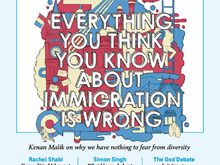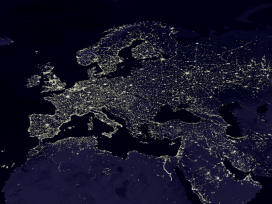One of the highlights of Hungary’s EU presidency was the launching of the EU Framework for National Roma Integration Strategies. But a closer look at the situation of the Hungarian Roma provides an alarming picture, writes Yudit Kiss. And more than sufficient reason to head westwards.
Articles
Read more than 6000 articles in 35 languages from over 90 cultural journals and associates.
Culture as opportunity?
On Sinti and Roma art and culture
Culture work provides Sinti and Roma people with opportunities to develop personally, combat negative modes of representation and intervene politically too. As such, it counterbalances the obstacles that the everyday realities of educational disadvantage and racism create, writes Hamze Bytyci. He takes two surveys on German Sinti and Roma from the past decade as his point of departure for sketching the artistic and cultural landscape, principally in Berlin, surrounding the Sinti and Roma.
Post-Orange Ukraine: Lost years?
A conversation with Tatiana Zhurzhenko
In an interview conducted before Euromaidan commenced, Tatiana Zhurzhenko discusses the intricacies of regional tensions surrounding Ukraine, taking into consideration questions of memory, language and a putative civic, liberal Ukrainian nationalism.

It is wrong to make immigration responsible for Europe’s social ills, writes Kenan Malik. Worse still is the way in which fortress Europe has created not only a physical barrier around the continent, but an emotional one, too, around Europe’s sense of humanity.
Culturally-led urban strategies rely more on selective images of cities than reflecting a socially and ethnically diverse urbanism, writes Malcolm Miles. For, under the surface, it is not civic renewal but economic and commercial motives that drive the cultural city.

Ukrainian civil society wants a truly independent Ukrainian and European nation. And Ukrainians understand that, in order to achieve this independence, they need to completely overhaul the political system. Anton Shekhovtsov on Euromaidan and the rebooting of Ukraine.
Euromaidan and beyond
Preliminary conclusions
Euromaidan is not just about failing to sign the Association Agreement, but Ukraine’s whole development as a country. For 22 years, it has been stuck in a grey zone between post-Soviet autocracies to the east and increasingly democratizing and prosperous neighbours to the west, writes Mykola Riabchuk.
Almost overnight, Ukraine ceased to be a “kingdom in the middle”. Now there are only three options left, writes Ivan Krastev: sign the agreement with the EU, as the majority of Ukrainians want; join Putin’s Eurasia, as the endangered political elite desire; or go bankrupt.

Democratic transition in post-Communist east-central Europe was primarily facilitated by external developments including the fall of the Soviet Union and European integration. Today, in the absence of any such favourable exogenous factors, it remains to be seen whether democratic institutions have grown strong enough in the region to withstand undemocratic and illiberal currents induced by the economic crisis.

Social media extend the range of participatory acts open to citizens. The result can be unpredictable leaderless mobilizations involving massive numbers of small donations of time and effort. And although the vast majority fail absolutely, a few succeed dramatically.
25th European meeting of cultural journals held in Norway
Conference report
Against the background of civil protest in Ukraine, the production of the public sphere was the subject of three days of debate at this year’s Eurozine conference, held in Oslo from 29 November to 2 December, and co-organized and hosted by the Norwegian Association of Journals and Eurozine partner journal Syn og Segn.

Creating a space for debate
European cultural journals and the making of the public sphere
As the 25th European Meeting of Cultural Journals commences in Oslo, it is timely to remember that cultural journals have long facilitated a level of intellectual exchange indispensable to societies that put stock in democratic and cosmopolitan spirit. And, as ongoing crisis overshadows the upcoming European elections and the European integration project risks being reduced to the task of reaching formal economic goals, the contribution of cultural journals to a European public sphere is more important than ever.
In the EU’s newest member state, an anti-homosexuality campaign has succeeded in forcing a referendum on the constitutional definition of “marriage”. Typical of a reactionary trend within Croatian civil society, it should warn other countries against failing to form political responses to social frustrations.
Updated on 5 December 2013: Croats voted overwhelmingly in favour of defining marriage in the constitution as a “union of man and woman”.

Two-and-a-half theories
Post-democracy in the age of global financial markets
Beyond do-it-yourself politics, short-lived mass protests in the metropolises and a further swelling of the ranks of the popular right, the democratization of democracy is still possible, contends Claus Offe. But not if political life remains locked within the “prison of the market”.